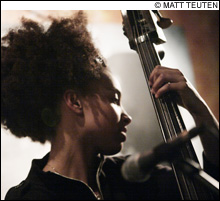
ALL TOGETHER, NOW! E speranza Spalding can lead a jazz singalong and get away with it.
|
It’s getting late on a Tuesday night at Bob’s Southern Bistro in the South End and I’m searching my memory for the last time I’ve heard and seen what’s happening now: a jazz singalong. Onstage is Esperanza Spalding, 21, the petite bass player with the towering Afro who came to Berklee as a 17-year-old and has since not only become, quite literally, the poster girl for the college, with a giant silhouette of her painted on the side of the Performance Center, but also a fixture around town, now teaching bass at the school where she was so recently a student, and showing up as a leader and sideperson in any number of local bands. (She’s at Bob’s every Tuesday night, and at Ryles June 8.)Tonight her trio has been joined onstage by her boyfriend, another Berklee grad with an even higher profile, trumpeter Christian Scott, playing a mix of standards and originals. Spalding’s playing style is so free and natural, it’s not hard to see why Berklee snapped her up after an audition in her home town of Portland, Oregon. She has a rich, beautiful tone and she’s a rhythm section player who always articulates a clear pulse even as she steps outside the beat, suspending it, stretching it, at the same time always contributing to the ongoing development of melody and harmony within the band. When she solos, the ideas seem to pour out of her almost faster than she can keep up — and that’s not simply a matter of velocity. It’s a commonplace to say that improvisers think ahead, but Spalding’s phrasing, varied as it is, with its own rhythmic-melodic motivic logic, defies easy riffing or scalar patterns. Her solos just seem to present themselves — all she has to do is catch them.
Which doesn’t even get to the singing. Spalding likes to sing as she plays bass, not so uncommon in pop and rock, where the basslines are “pre-set,” as Spalding likes to say, but rare in jazz, where the lines are continually shifting. And, as Spalding also points out, when she’s playing the highest register of her upright acoustic bass, she’s hunched over the instrument — the worst possible posture for a vocalist.
Her voice is small, light, idiosyncratic, and at Bob’s and on her new Junjo (Ayva, in stores June 6), it blends in, another instrument, in unison with her own bass or with the piano on the melody lines. But her improvisations are as free as her bass playing, her voice rolling over the melody in soft vowel sounds, unaccented by the hard consonants of bebop. And when she sings lyrics, as on the standard “I Fall in Love Too Easily” at Bob’s, she makes mature choices, as emotionally right as they are musical — for instance, in the way she drops from a high phrase to sing, “I fall in love too hard,” bringing that final word down. It’s no wonder that, given her on- and offstage charm, she’s one serious jazz musician who can lead a singalong as a set-closer (everyone humming her “I Adore You”) and get away with it.